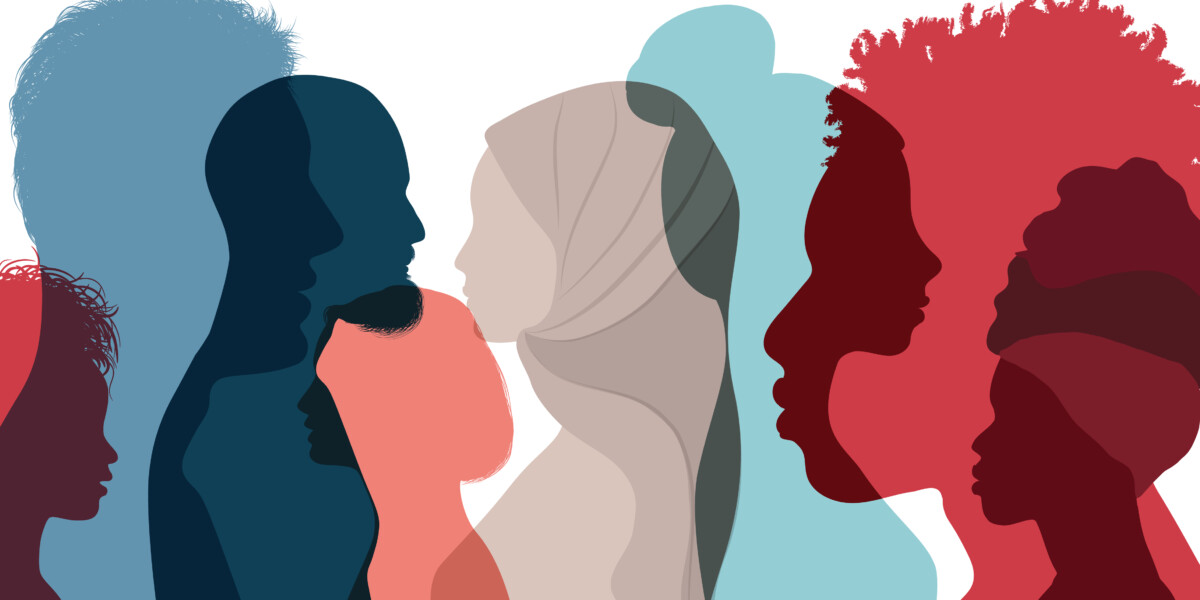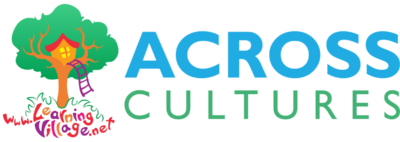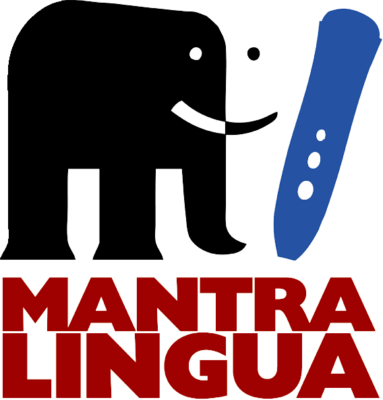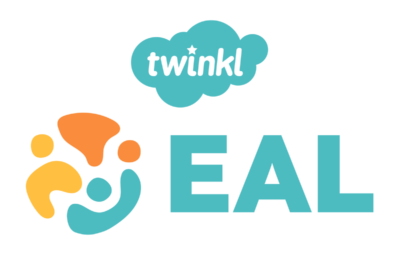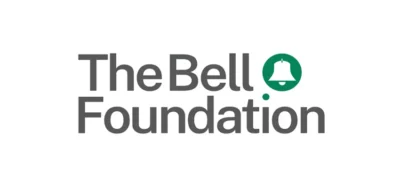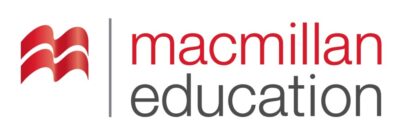Creating linguistically inclusive classrooms:
through activism, research and practice
Saturday, 30th November 2024
SEE THE MEMBERS’ AREA BELOW FOR THE CONFERENCE VIDEOS AND SPEAKER HANDOUTS
In the UK, it is estimated that around 20% of school-age children speak more than one language, many of whom are also new to learning in English. The linguistically inclusive classroom is a space where multiple languages can be used as tools for learning, for making connections and for enriching the learning experiences of all pupils.
The NALDIC32 conference provides a space for sharing the experience of activists, researchers, teachers and all practitioners working within linguistically diverse classrooms.
Two parallel formats
An in-person conference in Oxford. Saïd Business School, Park End Street, OX1 1HP (sold out)
An online conference where attendees will also be able to view in-person keynote speakers, enjoy online interactive presentations, and take part in round-table discussions.
Keynote Speakers
Both keynotes will be streamed live to the online conference participants.
Morning keynote: Making Worlds of Difference and Belonging: transformative classroom encounters
Yvonne Foley | University of Edinburgh
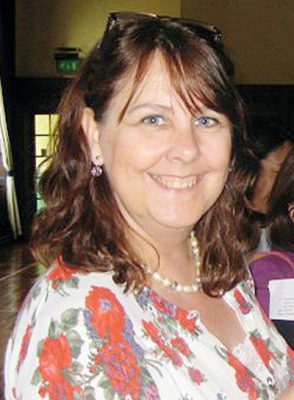 Dr Yvonne Foley is a Senior Lecturer at the University of Edinburgh, Scotland. Her research, teaching, and publications lie in the areas of teacher education, with a specific focus on languages, literacies, and identities in an effort to promote social, cultural and linguistic inclusion in educational settings. Yvonne has worked as a teacher and teacher educator for many years in the field of English as an additional language, both in Taiwan and across the UK. She taught for a number of years as an EAL teacher and EAL Coordinator in the American schooling system before moving back to the UK to take up the position as a teacher educator at the University of Edinburgh. Yvonne currently serves as the Chair of the National Association for Language Development in the Curriculum (NALDIC) and works with teachers and pupils in schools throughout the academic year. She currently teaches at the University of Edinburgh on postgraduate programmes that prepare both primary and secondary student teachers to address social, cultural and linguistic diversity in today’s classrooms. Yvonne’s current projects include a book about ‘Diverse Critical Literacies: Pedagogies of Recognition and Hope, to be published by Multilingual Matters, in May 2025.
Dr Yvonne Foley is a Senior Lecturer at the University of Edinburgh, Scotland. Her research, teaching, and publications lie in the areas of teacher education, with a specific focus on languages, literacies, and identities in an effort to promote social, cultural and linguistic inclusion in educational settings. Yvonne has worked as a teacher and teacher educator for many years in the field of English as an additional language, both in Taiwan and across the UK. She taught for a number of years as an EAL teacher and EAL Coordinator in the American schooling system before moving back to the UK to take up the position as a teacher educator at the University of Edinburgh. Yvonne currently serves as the Chair of the National Association for Language Development in the Curriculum (NALDIC) and works with teachers and pupils in schools throughout the academic year. She currently teaches at the University of Edinburgh on postgraduate programmes that prepare both primary and secondary student teachers to address social, cultural and linguistic diversity in today’s classrooms. Yvonne’s current projects include a book about ‘Diverse Critical Literacies: Pedagogies of Recognition and Hope, to be published by Multilingual Matters, in May 2025.
Afternoon keynote: Ready for the Hard-Re-Set: Opportunities for Equity in a Post-Pandemic World
Gloria Ladson-Billings | Professor Emerita
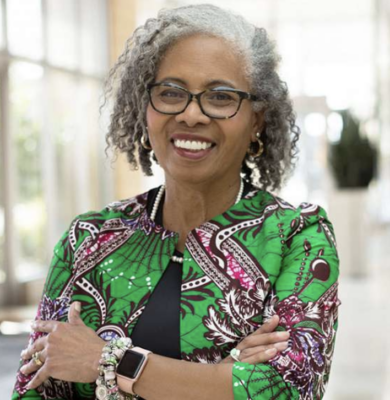 Gloria Ladson-Billings is Professor Emerita and former Kellner Family Distinguished Professor in Urban Education in the Department of Curriculum & Instruction and was Faculty Affiliate in the Departments of Educational Policy Studies, Educational Leadership & Policy Analysis and Afro American Studies at the University of Wisconsin-Madison. She is the Immediate Past President of the National Academy of Education. She is a Fellow in the American Academy of Arts & Sciences and the British Academy. Ladson-Billings’ research examines the pedagogical practices of teachers who are successful with African American students. She also investigates Critical Race Theory applications to education.
Gloria Ladson-Billings is Professor Emerita and former Kellner Family Distinguished Professor in Urban Education in the Department of Curriculum & Instruction and was Faculty Affiliate in the Departments of Educational Policy Studies, Educational Leadership & Policy Analysis and Afro American Studies at the University of Wisconsin-Madison. She is the Immediate Past President of the National Academy of Education. She is a Fellow in the American Academy of Arts & Sciences and the British Academy. Ladson-Billings’ research examines the pedagogical practices of teachers who are successful with African American students. She also investigates Critical Race Theory applications to education.
Ladson-Billings is the author of the critically acclaimed books, The Dreamkeepers: Successful Teachers of African American Children, Crossing over to Canaan: The Journey of New Teachers in Diverse Classrooms, and Beyond the Big House: African American Educators on Teacher Education. She is editor of 9 other books and author of more than 100 journal articles and book chapters. She is the former editor of the American Educational Research Journal and a member of several editorial boards. Her work has won numerous scholarly awards, including the H. I. Romnes Faculty Fellowship, Spencer Postdoctoral Fellowship, and the Palmer O. Johnson outstanding research award. She is the 2015 winner of the Social Justice in Education Award given by the American Educational Research Association. She was named the 2012 winner of the Brock International Prize in education. In 2018 she was awarded an honorary degree from Morgan State University. In 2012 she was awarded an honorary degree from the University of Alicante, Alicante, Spain. In 2010 she was awarded an honorary degree from the University of Massachusetts – Lowell. In 2002 she was awarded an honorary doctorate from Umeå University, Umeå, Sweden. During the 2003–2004 academic year she was a fellow at the Center for Advanced Study in the Behavioral Sciences, Stanford, California. In fall 2004 she received the George and Louise Spindler Award from the Council on Anthropology and Education for significant and ongoing contributions to the field of educational anthropology. In spring 2005 she was elected to the National Academy of Education and the National Society for the Study of Education. She is a 2008 recipient of the state of Wisconsin’s Martin Luther King, Jr. Heritage Award and the Teachers College, Columbia University 2008 Distinguished Service Medal. In 2015 she received the Distinguished Lifetime Achievement Award from the Literacy Research Association. In 2016 she received the Lifetime Achievement Award from the Benjamin Banneker Association of the National Council for Teachers of Mathematics. In Fall 2017 she received the John Nisbet Award from the British Educational Research Association at the University of Sussex in Brighton, England. In April 2018 she received the American Educational Research Association’s Distinguished Research Award and the Division B (Curriculum Studies) Lifetime Achievement Award. In 2023 she received the Professor A. Noam Chomsky North Star Life Time Achievement Award
In-person conference
Workshop 1
Hamish Chalmers | University of Oxford
Putting the ‘informed’ into evidence informed education: involving EAL practitioners in planning and conducting research
New educational research should be informed by what users of that research consider to be meaningful, relevant, and useful. By involving research users (teachers and other EAL practitioners) in setting research agendas and planning research projects, researchers can help to ensure that their research meets those expectations. This workshop will begin with a summary of a research Priority Setting Partnership, which identified the Top 10 questions EAL teachers in the UK have about their practice, and which can be addressed through research. The second part of the workshop will use that Top 10 to inform a deeper discussion about how these questions might be addressed through research, taking into account practical considerations, feasibility and possible outcomes. By participating in the workshop, participants will build on their understanding of the research process and contribute directly to helping to inform the way EAL research is conducted, such that it meets the aims of being meaningful, relevant, and useful for their practice.
Workshop 2
Danielle McKernan | Texthelp
AI in Practice – Effective Support for EAL Students
Join us for an essential exploration of AI for EAL practitioners and students. We’ll get hands on and explore and expand on the tools, strategies and activities that can support every student to create inclusive, personal and adaptive learning experiences that are within easy reach of every educator.
The session is drawn from the collective experience of how AI can impact learning for EAL students, firmly based on effective good practice drawn from classroom experiences across the globe and their positive pedagogical and inclusive impact in the time AI has been with us.
The session aims to reduce the fear and mystery around AI, provide teachers with safe and effective strategies to embrace EAL and multilingual learners and deliver a range of practical examples, tools and resources to help educators get up and running with the technology that is impacting all our lives.
Together, we’ll explore the challenges, risks, opportunities, and benefits that AI brings to the classroom. By the end of the session, you’ll have a comprehensive understanding of AI’s role in teaching and learning, its ethical considerations, and practical strategies to leverage AI for the success of EAL students.
Workshop 3
Deborah Perrin and Dilek Salki | Senior School Leidschenveen- British School in the Netherlands
Linguistically Inclusive Classrooms – Developing A Whole School Approach at Secondary
The overall aim of the workshop is to discuss effective strategies for setting up systems that promote multilingualism and embed translanguaging as a pedagogy to support all multilingual learners; creating linguistically inclusive classrooms.
In the workshop we will focus on how we enable language learners to use their full linguistic repertoire while learning English and curriculum content at the same time. We will explore why promoting translanguaging in linguistically diverse classrooms is essential and examine the role of the ELA / EAL teachers in this process. Using examples from our Senior School (SSL) at the British School in the Netherlands, a non-selective school, we will share practical implementations of translanguaging in both the ELA and subject lesson classrooms.
A focus at the secondary school has been to support subject teachers to understand why and how their students should be enabled to use their full linguistic repertoire. By implementing translanguaging in our English language acquisition lessons and using this as a concrete example for continuing professional development with staff, we have made progress in our long term aim of a whole school agreed pedagogy to multilingualism. Alongside of this we are developing our communication and information sharing with both the students and their parents so that they too value their own multilingualism.
We will share not only what we currently do but the challenges we experience due to the secondary school context.
We will structure the workshop into around four sections; each section will include a focus point with examples from our school practice and then an activity for attendees to take part in on this point, planning in the time for attendees to share with us their experiences and practical examples.
Workshop 4
John Claughton | World of Languages, Languages of the World
WoLLoW – a KS2/3 programme that solves all the problems of language teaching – possibly
WoLLoW’ is a free languages programme, developed by teachers over the last 6 years, which aims to bring excitement, interest, curiosity, exploration and dialogue into the study of languages. It doesn’t aim to teach a language, but to teach how languages work, their history, their relationships to each other. In so doing, it:
- encourages pupils to talk about their own languages and cultures.
- allows pupils to be enthused by code-breaking and problem-solving together.
- enables pupils to see how the study of languages is related to all other subjects and key issues.
- prepares them for the study of languages in KS3.
However, for all this, it’s not just a languages programme. It’s more than that. It:
- generates relationships and understanding between pupils.
- gives pupils a voice and the chance to take pride in their own heritage.
- develops links between the school and home and contributes to a sense of community.
- brings together all pupils and works particularly well for EAL and SEND pupils.
And it really works in state and independent schools, in primary and secondary schools, in the UK and abroad. In the workshop people will be able to test-drive some of our lesson resources on topics particularly relevant to EAL pupils.
Workshop 5
Charlotte Ryland | Stephen Spender Trust
Creative Translation
Creative Translation makes creativity and culture in the primary/secondary classroom both accessible and inclusive. It enables groups of students from diverse backgrounds to share great texts and to create together.
Join Charlotte Ryland for a hands-on workshop that will showcase how Creative Translation works in practice, and how you can immediately implement it with multilingual groups in your schools. Charlotte will also talk about how competitions and publications can motivate students, inspired by the Stephen Spender Youth Prize, which featured entries from over 70 languages this year.
“It was so inspiring and fun, and has given me lots of ideas about how I might involve my many EAL students to be the experts in the room.” – Secondary English teacher, participant in a Creative Translation For Teachers webinar
For more information about Creative Translation, visit: https://www.stephen-spender.org/what-is-creative-translation/
Presentation 1
Alexandra Inglis, Niki Cooper-Robbins | University of Cologne, University of Chester
“How do you say that in your language?”: Translanguaging, Identity and Learners’ Right to Linguistic Autonomy in Education
“How do you say that in your language?” is a question that can often be heard in multilingual classrooms, and, at first glance, seems easy enough to answer. However, there are times when dealing with this question requires linguistic, cultural and political awareness. To avoid making well-intentioned assumptions, this presentation explores the nuances of translanguaging within the multilingual classroom.
Translanguaging, using students’ full linguistic repertoire for learning, has often been claimed to support language learning, improve academic performance and reaffirm one’s linguistic heritage. The benefits of translanguaging are many and are well-documented. However, is translanguaging the right way forward in any multilingual classroom and for every multilingual learner? Does translanguaging foster student agency and empower all students to tap into their linguistic repertoire? Can we assume that our students share our enthusiasm about using home/heritage languages? Are home/heritage languages tied to a sense of identity? Could encouraging students to use them potentially lead to triggering situations? Is being a language ambassador something that students could opt out of without any perceived consequences?
Drawing from their identities as multilingual educators and researchers, Alexandra Inglis and Niki Cooper-Robbins invite you to listen in on their conversation as they explore the nuances of translanguaging pedagogy in multilingual contexts.
Presentation 2
Gabrielle Flockton | Lancaster University
Enhancing Teacher Training for English Language Learners: Practical Insights from Initial Teacher Education Programs
As schools in England become more linguistically diverse, improving teacher preparedness and confidence in working with English Language Learners (ELLs) is crucial (Cunningham, 2019; Demie, 2018). Despite the growing ELL population, fewer than 50% of Newly Qualified Teachers (NQTs) feel prepared to teach ELLs, revealing gaps in Initial Teacher Education (ITE) programs (Starbuck, 2018). This study explores how ITE programs can better prepare teachers to meet ELLs' needs by incorporating targeted strategies and practical experiences.
The research, using a mixed-methods approach, underscores the importance of integrating Second Language Acquisition (SLA) theories and English Language Teaching (ELT) practices into ITE curricula (Lucas & Villegas, 2010). Findings show that hands-on classroom experience with ELLs significantly boosts trainee confidence and preparedness (Franson, 1999; Cajkler & Hall, 2009). The study highlights the need for structured, real-world training opportunities, such as extended placements in diverse classrooms, and supplementary e-learning materials that trainees can access independently during placements to accommodate limited course time.
This research provides actionable recommendations for ITE programs to ensure future educators are better equipped to support ELLs, contributing to more inclusive and effective teaching in multilingual classrooms.
Presentation 3
David Larkin | Dublin City University
Exploring the construal and inclusion of students for whom English is an additional language in Irish second level schools
Recent Central Statistics Office (CSO, 2024) figures have shown that Ireland’s newcomer population is now over 836,200 constituting 15.5 per cent of the total population. A rise in newcomer families has resulted in Ireland’s schools becoming increasingly multicultural and multilingual educational spaces. As a result, post-primary teachers have been required to adopt innovative teaching responses and to be more conscious and inclusive of newcomer learners, in particular, those for whom English is an additional language (EAL). This presentation will outline the findings of a recent dual case study that focuses on a DEIS and non-DEIS school (Larkin, 2024).
This presentation aligns with this conference’s theme by looking at innovative ways of exploring the ever changing topography of Irish schools. To this end, this presentation innovates by incorporating visual methods within a qualitative approach to critically investigate how students learning EAL are construed and included within under-explored policy, cultural and physical spaces in secondary schools.
Qualitative data based on documentary analysis, a semi-structured walkthrough, photo elicitation and semi-structured interviews was interpreted using Gramscian and Bourdieusian conceptual frameworks to explore how students for whom EAL were construed and included and/or marginalised.
Findings suggest that the origin and circumstances of immigration and social class seemed to be a significant factor in how these learners were construed by their teachers. Moreover, school and teacher autonomy played a significant role in responses and innovations designed to respond to secondary learners for whom EAL. This presentation contributes to the wider field of educational research in a number of ways. Educators who may be in similar contexts may find relatable features from this study to their own settings. From a methodological perspective, researchers may find some of the theoretical underpinnings and data collection methods utilised are beneficial to future research projects. Research pertaining to students for whom EAL at post-primary level is an under-explored educational space. This study attempts, in some way, to close this gap. Implications of this study include supporting teachers in recognising and valuing EAL learners’ identities in school policy and practice, teacher educators and the Teaching Council of Ireland.
Presentation 4
Anna Machura | University College Cork, Ireland
Empowering Student Voice, Activism and Perspective Through International Project-Based Learning
Teaching learners in the 21st century has undergone significant changes. Not only has the role of the teacher changed dramatically, but also the nature of techniques and strategies that have been used to better support our culturally diverse students. The main focus though is always placed on enriching the learning experience for all involved, regardless of their background or experiences. Each student should be seen, visible and heard in the classroom. EAL and bilingual learners have distinct and different needs from other pupils; therefore, teachers should look for additional ways of addressing their individual needs. One of the much-needed approaches to recognise this is collaborative learning where learners are invited to participate in various activities, exchange ideas and work out solutions together. International project-based learning offers a new, fantastic opportunity for EAL and bilingual learners to be included and appreciated even more while nurturing their true identities. International project-based learning allows children to share their perspectives, empower their voice and welcome activism. In my interactive workshop, I would like to present the steps for creating a multicultural platform for student and teacher engagement based on my hugely successful international projects carried out in 10 different countries, including Ireland, Norway, Latvia, Algeria, Iran, Palestine, Kuwait and Saudi Arabia. The theme of the projects (positive thinking & supporting others) addressed learners’ diverse interests successfully, and most importantly, the participants became part of one incredible, truly inclusive experience through storytelling, poems, songs, drawings or multimodal presentations. By sharing their masterpieces among schools globally, they all showed other learners how to embrace diversity from a unique perspective, creating linguistically inclusive classrooms. I believe presenting the ideas to educators during the conference will be beneficial in many ways.
Presentation 5
Constant Leung and Christina Richardson | King’s College, London
The Language of Schooling – an exclusionary zone for EAL?
This three-part presentation offers a grounded view of the curriculum provision for pupils
from minoritized language backgrounds. In the first part we give a brief description of the
English-first policy for all pupils – EAL and multilingualism matters are conspicuous by their
absence. After that we provide the views of teachers regarding their experiences in trying
to address EAL and multilingualism issues in their professional work; our account draws on
teacher writings in the EAL Journal and interviews. Collectively these teacher accounts point
to a wide array of challenges at classroom, school and curriculum levels. In the concluding
remarks we report some of the ideas suggested by teachers for positive action.
Presentation 6
Natacha Guillaumin | Boroughmuir High School
Amener les langues à l’anglais: multilingualism in the English classroom
This contribution will be mostly based on my personal experience as a native French speaker at the beginning of my teaching journey in Scotland, alongside testimonies from other teachers in Scottish secondary schools, and professional readings focused on EAL pedagogy.
I will talk about experiences that shaped my budding understanding of how teachers work to create linguistically diverse classrooms, why it is crucial to do so, and what barriers can be experienced. I will also share practices I have experimented with and how they were received, what impact they had on learners and on myself.
Decolonising the curriculum is a frequently discussed topic, particularly in terms of the resources used. However, I believe that we should also decolonise our pedagogies through the languages we use in the classrooms, to oppose the dominance of a single language and cultural perspective. Using EAL pedagogies such as inviting students to use and share their first language in class, or showing and using different languages that may or may not be represented in the classroom is not only beneficial for EAL learners, but it invites every student to discover different languages, cultures, points of view.
Although EAL learners require differentiation in the classroom, this differentiation is beneficial to all learners as it provides them with extra scaffolding, and with extra knowledge that EAL learners hold.
Presentation 7
Dr. Chandrika Devarakonda, Dr.Rebecca Crutchley | University of Chester
Cultural and Linguistic Brokering Roles of Migrant and EAL (English as an Additional Language) Children in Schools : perspectives of educational professionals
This small-scale qualitative research project explored educational professionals’ perspectives and experiences of the cultural and linguistic brokering roles undertaken by migrant children for whom English is an additional language within schools and settings in North-West England. Children are considered experts as they access school and are often exposed to the language and customs of their country of resettlement before their parents, thereby becoming ‘experts’ in the family. Staff at schools, settings and bilingual support services throughout Shropshire and North-West England were sent online surveys and asked to participate in focus group discussions to share their experiences and perspectives.
The findings related to benefits and challenges for children in their brokering role. Findings relating to benefits include cognitive development by enhancing problem solving skills, cognitive flexibility, and language processing abilities, promotion of linguistic development in both English and the child’s home language, fostering maturity and a sense of accountability, and strengthening the parent child relationship. There were several challenges such as creating stress and confusion due to heavy responsibilities, feelings of shame, embarrassment related to parents’ poor English skills and children’s ability to explain complex issues.
Presentation 8
Emily Hamblin | UK Resettlement Team, North Somerset Council
Ukraine Art Fusion
The presentation will discuss the growth of the idea and concept of the Ukraine Art Fusion project and the influences that informed the project across schools in North Somerset by the advisory teacher from The UK Resettlement Team. The selection of Maria Prymachenko being the artist chosen for the project will be explained. The purpose of the project will be explored from bringing Creative Arts into EAL teaching, broadening cultural inclusivity in schools, widening diversity within the curriculum, supporting the emotional well-being and sense of belonging of the Ukrainian children and their families within their schools and the local community, providing a safe, inclusive, trauma-informed space on themed activities celebrating the Ukrainian artist and her art work, celebrating the Ukrainian language, facilitating a sense of collaboration and connection across primary and secondary schools, hosting a participatory exhibition with a special opening evening event, holding a joyous fun-filled event celebrating children’s beautiful art work – of different ages and abilities and including those with SEND. Important practical issues will be considered such as getting schools initial engagement and participation in the project, on-going communication with schools during the project, designing posters, open evening invitations and participation certificates for the exhibition – all in English and Ukrainian, choosing the venue, carrying out risk assessments, resources needed, support from team and colleagues, funding the project, holding the five day exhibition. The impact of the project will be shown visually by photographs of the project in schools and of the final exhibition, as well as the trauma-informed spaces and participatory art and sensory activities at The Tropicana, in North Somerset. The extremely positive comments and feedback from child voice, parent/carer voice and professional voice with their response to the project and exhibition will be shared and evaluated. The presentation aims to inspire, motivate and encourage delegates to have the skills and confidence to carry out a similar project with children across their own schools – as well as give practical tips in ways the project could be adapted or extended for their circumstances.
Presentation 9
Glynis Lloyd | Bell Foundation
Using books in multiple languages in literacy work
There are many advantages for multilingual children learning English to continue to use and develop their home language:
- They are likely to do better at learning English, as they will have language resources and knowledge about language that they can transfer to their learning in English.
- Reading in and using their home language at school affirms a vital part of their identity, especially where the books they read represent their ways of living in the world.
- For children new to English and to the English schooling system, opportunities to read and use their home language help to create a safe and calm space from which they can explore and learn in English.
This presentation will elaborate on the purpose and value of using multilingual texts and books in multiple languages in multilingual classrooms. The session will illustrate ways of using multilingual books and draw on some of the rich history of schools that have harnessed family linguistic resources to build children’s literacy.
The presentation will showcase current practice at St Bernadette’s Primary School in Harrow, where multilingual children are encouraged and enabled to read in their home languages, as they build foundations for literacy learning in English.
Presentation 10
Sinem Hizli Alkan | Anglia Ruskin University
A critical review of prospective teachers’ proposed practices to address language diversity in early years mathematics
Language diversity is gaining increasing attention in teaching and learning of mathematics – a subject which is often perceived as universal, and language and culture free. However, recent theoretical and empirical work in this area have challenged these assumptions. It is argued that mathematics education always occurs in language diverse contexts (Barwell et al., 2016), necessitating teaching practices that consider students’ cultural and linguistic backgrounds. This presentation draws on our recently published article (Hizli Alkan & Sahin Ipek, 2023) involving Year 1 Primary Education Studies students and their proposed practices to address the so-called ‘language gap’ in teaching and learning mathematics in early years. We will explore the nature of their proposed practices and how they aim to address language diversity. The practices are categorised into three broad themes: explicit vocabulary teaching (e.g., offering child friendly definitions, creating word walls); scaffolding (e.g., the use of multiple representations, pairing students who speak the dominant language) and multi-sensory approaches (e.g., the use of outdoor play, cooking). In our presentation, we will provide a critical analysis, linking these practices to the literature on the relationship between language and mathematics. Our findings suggest that the proposed practices prioritised vocabulary teaching, and at times aimed to reduce the discursive elements of the lesson, with limited attention to the socio-cultural resources that students bring to the classroom. Although a few examples acknowledged the importance of home-school connections, most of the practices lacked criticality and creativity. We will problematise how language diversity either was seen as a ‘problem’ or often was a neglected aspect in these practices.
Online conference
Workshop
Joanna Kolota | Trinity Academy Leeds
‘Don’t Include Them Out’: Supporting Multilingual Learners in Secondary Schools
The objective of this workshop is to equip teachers with a unified, research-backed approach to effectively support multilingual learners across the school by introducing the Multilingual Learners Toolkit. By aligning instructional practices with students’ English proficiency levels as suggested by Cummins (2021), it is aimed to foster high academic expectations while providing necessary support. This workshop will delve into modifying instruction based on students’ English proficiency, incorporating proactive planning of materials and adaptive teaching methods. Participants will explore strategies that integrate content and language learning, ensuring a balanced approach that maintains high expectations while offering essential support.
Throughout the session, I will focus on proactive planning and adaptive teaching techniques, emphasising the importance of integrating content and language. I will cover specific strategies for vocabulary development, enhancing reading and writing skills and teaching context-embedded grammar. By the end of the workshop, teachers will be equipped with practical tools and strategies to create a supportive and high-expectation learning environment for multilingual learners, ensuring consistent implementation across the school and fostering an inclusive and academically enriching experience for all students.
Cummins, J. 2021. Rethinking the Education for Multilingual Learners. Bristol: Multilingual Matters.
Presentation 1
Lisa Pongpiriyaporn | Mount Zaagkam International School
Increasing access and engagement through meaning-making approaches
In recent years there has been much emphasis on the science of reading and building strong literacy practices in mainstream classrooms. Multilingual learner pedagogy has sat largely outside of this research, viewed as a specialist area on the edges of mainstream practices, much like the learners it seeks to nurture.
In mainstream education ‘language’ is often understood as named languages such as Arabic, French, Mandarin etc. However, in multilingual learner education, Garcia and Wei (2018) define language as ‘the human capacity to connect with others and communicate ideas through a semiotic (meaning-making) repertoire. This repertoire includes linguistic features (words, sounds, structures, etc.) and multimodal features (such as gestures, images, sounds, etc.)’. For multilingual learners, this repertoire, or schema of meaning, including all the named languages, is called idiolect. Translanguaging is the process by which students actively draw on all their full linguistic resources (idiolect) to communicate and make meaning, Garcia, Johnson and Seltzer (2017).
Very recent research (Wyse and Hacking, 2024) is starting to connect and emphasize the concept of meaning-making with theories that mainstream literacy practices are grounded in, such as the Simple View of Reading (Gough & Tunmer, 1986; Hoover & Gough, 1990; Hoover & Tunmer, 2022) and Scarborough’s Reading Rope.
All language development needs to be grounded in meaning-making. This concept of meaning-making is important for all students, regardless of named language/s. Have we reached the point in time where mainstream literacy practices in schools need the help of multilingual learner research?
This workshop, inspired by the Double Helix Theory of Reading and Writing (Wyse & Hacking, 2024) focuses on how we can increase meaning-making practices in mainstream classrooms for all learners.
Practical examples show how to:
- connect the processes of reading and writing
- use pedagogical translanguaging approaches
- develop language and culture portraits to foster identity and belonging
Presentation 2
Sarah Guinon | Australian International School Hong Kong
Mastering Language Through Subject Journals: Unlocking an 81% Error Reduction
Discover a powerful intervention program designed to boost language skills and support English as an Additional Language (EAL) learners. This unique approach combines subject journaling with substitution tables, targeting common grammar errors. The results speak for themselves, with an impressive 81% reduction in errors and a significant 64% increase in student writing length.
Implementing the intervention is simple and efficient, requiring just 10 minutes per week of 1:1 conferencing between students and either an EAL specialist or a dedicated classroom teacher. Additionally, students are encouraged to engage in 20 minutes of weekly journaling at home, fostering language development and self-expression.
During the presentation, I will showcase the carefully selected books that form the foundation of our program. These resources will be instrumental in guiding students towards success. Moreover, I will provide a detailed overview of a typical session, giving you a glimpse into the practical aspects of our approach.
I will share the impact that this intervention has had on our students’ Cognitive Academic Language Proficiency. By strengthening language skills and cognitive abilities, we are empowering learners to excel academically and independently.
Presentation 3
Dr. Jennifer Eddy | Queens College, CUNY
Teacher as Designer with Learner as Mediator for Creative Transcultural Communicative Competence
How do we design a linguistically inclusive curriculum for transferable concepts and goals with relevance to community, career, and life? How can our multilingual learners compare, reflect, facilitate and collaborate with others to move transcultural communicative competence forward and place new language and cultural contexts within reach for others? In this presentation, I explain the principles which underpin this design process and share successes and lessons learned from the Voices in the Field. Using exemplars from England, Wales and the United States, we will unfold concepts and pupil deliverables for progression across levels within transdisciplinary themes. Through their tasks, our multilingual learners solve problems and create products with value beyond the classroom and reflect upon their own cultural practices and perspectives. Pupils discover they can make language accessible and culture visible, public and shared. They develop the confidence to use language(s) they own right now to mediate for others within, across and among languages and cultures. In this interactive session, participants will receive tools and templates for design and application within their educational context.
Presentation 4
Anna Czebiolko | British International School of Houston
Curriculum Intent in Multilingual Education: Embedding Multilingualism in Educational Frameworks
A linguistically inclusive classroom leverages multiple languages as tools for learning, fostering connections, and enriching the educational experiences of all students.
Recognising the significant value of multilingualism, this paper is dedicated to embedding this belief into educational environments. This session is designed to utilise leadership theories and practices to provide educational leaders, consultants, teachers and practitioners with the necessary tools to promote multilingualism in schools. By the conclusion of the workshop, participants will have become familiar with Curriculum Intent that enhance commitment to multilingual education and prepare them for effective implementation.
This practical session will concentrate on: policy development, determining the main priorities for multilingual education and formulating strategies to accomplish the established goals. One crucial aspect of implementing an effective whole-school approach to support multilingual students involves developing a comprehensive developmental plan. This session will explore how to create such a plan in detail. Finally, drawing on transformation theories, questions about how to maintain positive changes over time will be explored.
The session’s content is universal and can be personalised for different environments, ranging from individual classrooms and entire schools to districts.
Poster
Sarah Guinon | Australian International School Hong Kong
Beyond the Surface: Unlocking True Diversity in Schools with a Pyramid of Possibilities!
In the realm of education, diversity is a buzzword that often remains at the surface level. While many schools aim to showcase representation through children’s books and visuals, it’s time to dig deeper and embark on a journey towards genuine inclusivity.
I have made a poster that unveils the pyramid of practical strategies for schools to truly commit to diversity beyond the cultural fair level. It can hopefully be a roadmap to transformation.
With each level of the pyramid, It guides a school through actionable steps that will unlock the true potential of diversity. Say goodbye to tokenism and hello to meaningful change. Together, we will go beyond representation and foster an inclusive environment where every student feels seen, valued, and celebrated.
This poster is more than just a visual, but hopefully a catalyst for change. It will spark conversations, ignite ideas, and inspire educators to take bold steps towards a more inclusive future.
Member only content
The remaining content on this page is available to members only.
To access it and join NALDIC, click the button below.
or if you are a member...


